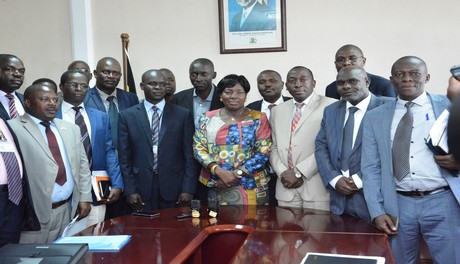
Local Government leaders have asked Parliament to consider improving and waive taxes on emolument and allowances of Councillors.
In a petition presented to the Speaker of Parliament, Rt. Hon. Rebecca Kadaga, the leaders asked for a gross total monthly remuneration package of UShs 15 million. They also recommended that in addition to the proposed specific amount per District Chairperson, government registers a 100 percent increment for emoluments of other Executive Leadership and Councillors at district, Municipal Sub County and Town Council Local Governments.
“Government should waive the Pay As You Earn Tax and any other tax on Councillors’ allowances and emoluments given that the monies for all intents and purposes are meant to facilitate their work as representatives of the people with a mandate to deliver services at the local level,” said Martin Ojara, the Chairperson Gulu district.
Ojara, who is also the Vice President (North) of Uganda Local Government Association, led his Executive Committee and Leadership to present their petition to the Speaker of Parliament, Rt. Hon. Rebecca Kadaga, today, Friday 23rd June 2017.
Ojara said that given that the National Budget recognizes that the economy changes in terms of growth and inflation, it is important that the changes are also reflected in the funds sent to local governments.
Petitioners also said that although the National Budget had increased steadily since the financial year 2010/2011, the share allocated to local governments had reduced gradually. They also said that wages continued to dominate local government budgets leaving little for service delivery.
“This unfavourable allocation coupled with poor local revenue generation translates into severe financial shortfall for local governments,” said Ojara adding that “Parliament needs to make a legal provision to establish a minimum share of the Local Government of the National Budget as is the case in Kenya and Thailand; which will shield local governments from deductions.”
The group warned that weak party structures and processes at the local levels are not preparing citizens for effective participation in multiparty democratic politics, recommending a National Civic Education Strategy to inform and educate the population.
They further said that the delay by government to conduct induction for newly elected Local Government leaders to empower them to effectively perform their expected roles, was causing of conflict at those levels.
Ojara in his submission said that they continued to get complaints from technical teams on the performance of the newly elected political leadership in addition to unnecessary interferences, which affect service delivery.
Speaker Kadaga said that she had asked Members of Parliament to find areas from which to raise funds to boost local governments. She promised to support local governments, which she said, were “holding ground on behalf of legislators at the local levels.”
Kadaga said Parliament had provided for an increment in pay of leaders at the local level, a proposal that was rejected by the President.
“You have our support. We need to ask government to organize money for you to do your work,” said Kadaga.
She also promised to ask Institute of Parliamentary Studies to organize training for local leaders.
